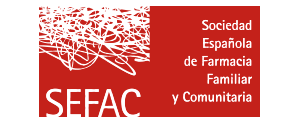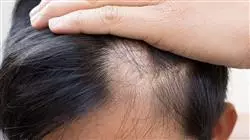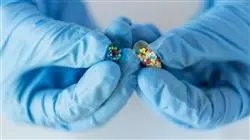University certificate
Scientific endorser

The world's largest faculty of pharmacy”
Why study at TECH?
This Postgraduate diploma in Medication for Dermatologic Pathology in Community Pharmacies is the most complete and up-to-date scientific program on the market”

Whether it is because of easy access to pharmaceutical advice, the user's trust in the pharmacist, or other reasons, community pharmacists are obliged to be trained and constantly updated in Medication for Dermatologic Pathology in Community Pharmacies, and more specifically for dermatologic pathologies.
Dermatology is a medical specialty broad enough to require specialized training, so it is also necessary for community pharmacists to broaden their knowledge of the approach to Medication for Dermatological Pathology in Community Pharmacy in order to improve their performance in the professional pharmaceutical services they provide to their patients.
This Postgraduate diploma in Medication for Dermatologic Pathology in Community Pharmacies is the most complete and up-to-date scientific program on the market”
This Postgraduate diploma in Medication for Dermatologic Pathology in Community Pharmacies is the most complete and up-to-date scientific program on the market. The most important features of the program include:
- Address the most common dermatological pathologies consulted in community pharmacies, review of the treatments available, referrals and action protocols
- Review of other less consulted pathologies but no less important. Although they will always be referred to pharmacists, we must know perfectly well how to support patients in case of doubt regarding treatments or evolution, since they may be more complex pathologies, which can generate more doubts about their treatments
- We will address the dermatological problems that generate common chronic diseases
- Clinical cases will be presented for professional improvement.studies the different types of Nutraceuticals and their Uses
- All this will be complemented by theoretical lessons, questions to the expert, debate forums on controversial topics, and individual reflection assignments
- Content that is accessible from any fixed or portable device with an Internet connection
This Postgraduate diploma may be the best investment you can make in the selection of a refresher program for two reasons: in addition to updating your knowledge of Medication for Dermatologic Pathology in Community Pharmacies, you will obtain an qualification from TECH Global University”
Its teaching staff includes community pharmacy professionals belonging to the field of Medicine for Dermatological Pathology in Community Pharmacy, who contribute their work experience to this training, in addition to recognized specialists belonging to leading scientific societies, such as the Spanish Society of Family and Community Pharmacy.
The multimedia content developed with the latest educational technology will provide the professional with situated and contextual learning, i.e., a simulated environment that will provide an immersive training program to train in real situations.
This program is designed around Problem Based Learning, whereby the Care Services must try to solve the different professional practice situations that arise during the course. For this reason, you will be assisted by an innovative, interactive video system created by renowned and experienced experts in the field of Pharmacology with extensive teaching experience.

Increase your decision-making confidence by updating your knowledge with this Postgraduate diploma in Medication for Dermatologic Pathology in Community Pharmacies"
Syllabus
A compendium of knowledge created to give pharmacists the opportunity to catch up or incorporate the most advanced knowledge in skin care on the current scene. With the confidence and solvency of the largest in-Spanish online university in the world.

This Postgraduate diploma in Medication for Dermatologic Pathology in Community Pharmacies is the most complete and up-to-date scientific program on the market”
Module 1. Most Common Dermatological Pathologies: Drugs and Medical Devices used in Prevention and Treatment. Action Protocols and Referrals to a Physician
1.1. Sensitive and Reactive Skin
1.2. Acne
1.3. Alopecia
1.4. Ichthyosis
1.5. Xerosis
1.6. Hyperhydrosis
1.7. Seborrheic Dermatitis
1.8. Atopic dermatitis
1.9. Contact Dermatitis
1.10. Pigmentation Disorders
1.10.1. Hyperpigmentation
1.10.2. Hypopigmentation
1.11. Rosacea.
1.12. Psoriasis.
1.13. Pruritus
1.14. Urticaria and Angioedema
1.15. Scalp Desquamative Conditions
1.16. Toxicoderma
1.17. Hidradenitis
1.18. Skin Lesions
1.18.1. Injuries
1.18.2. Burns
1.18.3. Stings
1.18.4. Hyperkeratosis
1.19. Scars
1.20. Chronic Wounds
1.20.1. Pressure Ulcers
1.20.2. Ostomies
1.21. Skin Infections and Infestations caused by Pathogenic Agents
1.21.1. Bacteria
1.21.2. Virus
1.21.3. Fungi
1.21.4. Parasites
1.22. Sexually Transmitted Diseases
1.23. Oral Mucosa Infections
1.23.1. Gingivitis
1.23.2. Aphtha
1.23.3. Fungi
1.24. Nail and Phanera Affections
Module 2. Other Dermatological Pathologies: Drugs and Medical Devices used in Prevention and Treatment. Action Protocols and Referrals to a Physician
2.1. Connective Tissue Diseases
2.1.1. Lupus Erythematosus
2.2. Connective Tissue Diseases II:
2.2.1. Dermatomyositis
2.2.2. Scleroderma
2.3. Oncologic Skin Diseases:
2.3.1. Actinic Keratosis
2.3.2. Melanoma
2.4. Oncologic Skin Diseases II
2.4.1. Sarcomas
2.4.2. Cutaneous Lymphomas
2.4.3. Merkel Cell Carcinoma
2.5. Dermatological Conditions derived from Oncological Treatments
2.5.1. Radiotherapy
2.5.2. Chemotherapy
2.6. Dermatological Conditions derived from Chronic Processes
2.6.1. Diabetes
2.6.2. Kidney Diseases
2.6.3. Liver Diseases
2.6.4. Vascular Diseases
2.6.5. Infectious Diseases

A unique, key and decisive training experience to boost your professional development"
Postgraduate Diploma in Medication for Dermatologic Pathology in Community Pharmacies
Dermatological pathology affects a large number of people and, in many cases, requires specific treatments to alleviate symptoms and improve patients' quality of life. In community pharmacy, pharmacists play a key role in providing information and guidance on the medications used in the treatment of these conditions. If you want to specialize in this field, TECH Global University has the ideal program for you. The Postgraduate Diploma in Medication for Dermatologic Pathology in Community Pharmacies is an online postgraduate course of the highest standard, which presents itself as a unique qualification opportunity to take your skills to the next level. Here, you will immerse yourself in the fascinating field of skin diseases and learn how to identify, treat and advise on common dermatological pathologies.
Get your degree from the world's largest online pharmacy school
Our academic program, supported by experts in dermatology and pharmacy, will provide you with comprehensive, up-to-date training on medications used in the treatment of dermatologic pathologies. During the course, you will explore a wide range of topics, from the basics of skin anatomy and physiology, to the pharmacological management of specific dermatological conditions such as acne, psoriasis, skin infections and more. You will learn how to evaluate patients' symptoms, perform appropriate pharmacotherapeutic monitoring, and offer practical advice for the care and maintenance of healthy skin. Upon completion of the course, you will receive a recognized university certificate that will validate your new knowledge and give you a competitive edge in the workplace. You will be able to apply what you have learned in your professional practice, offering your patients a specialized and quality service.







